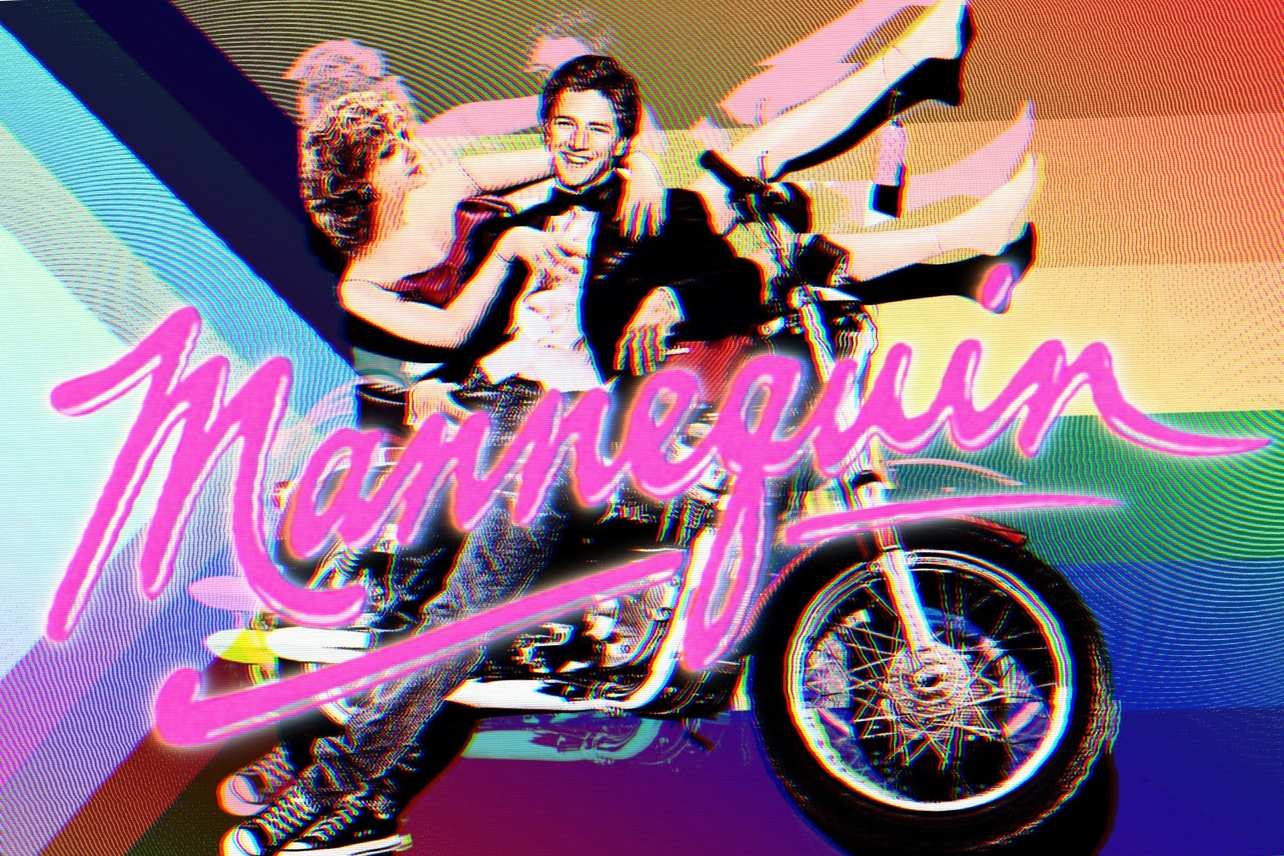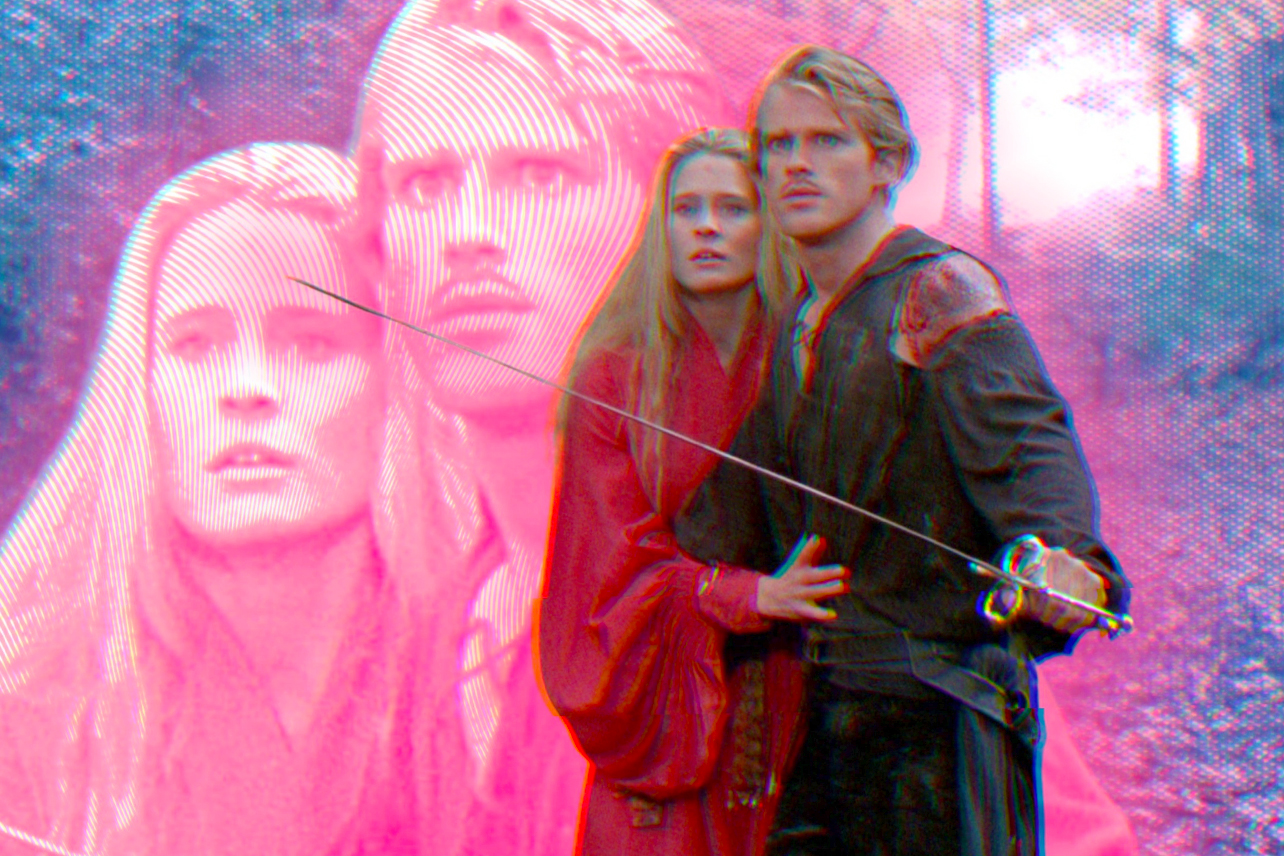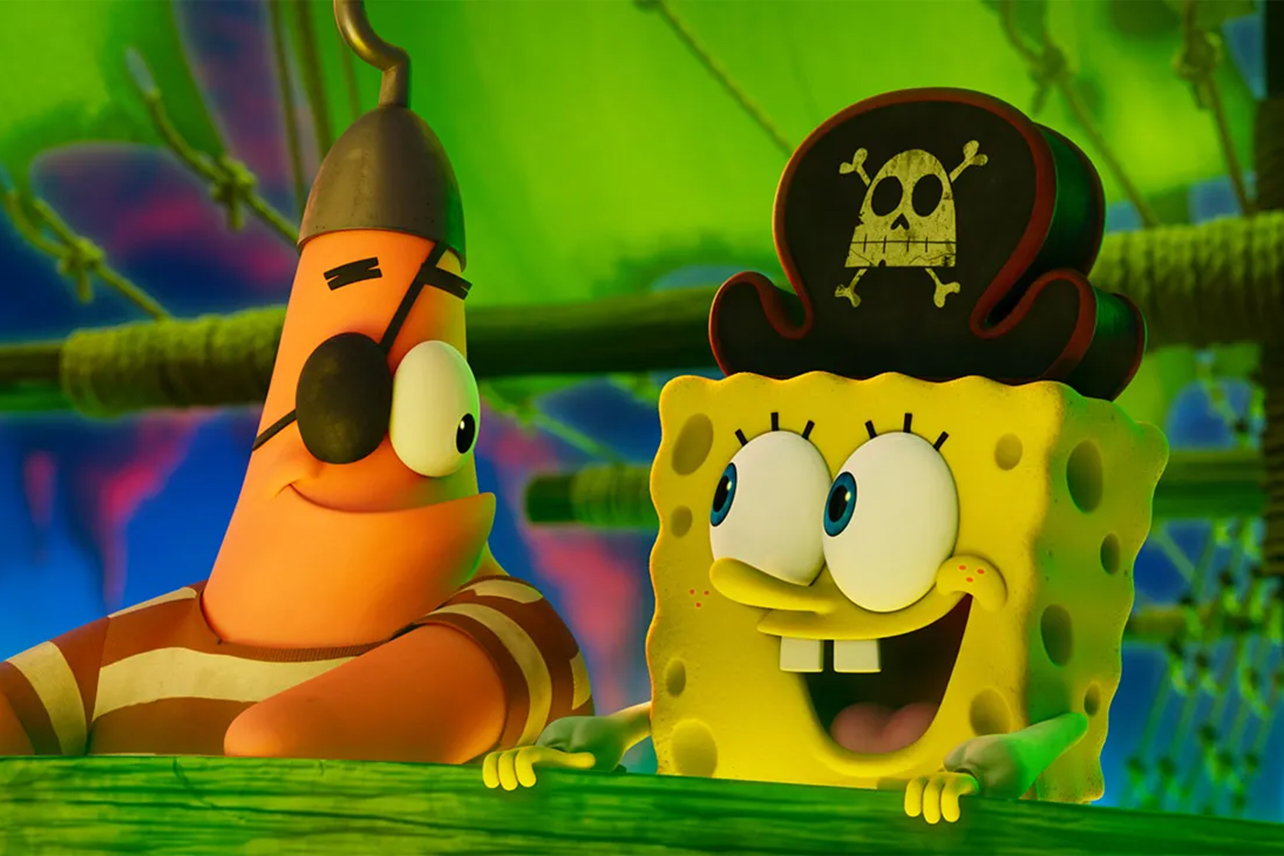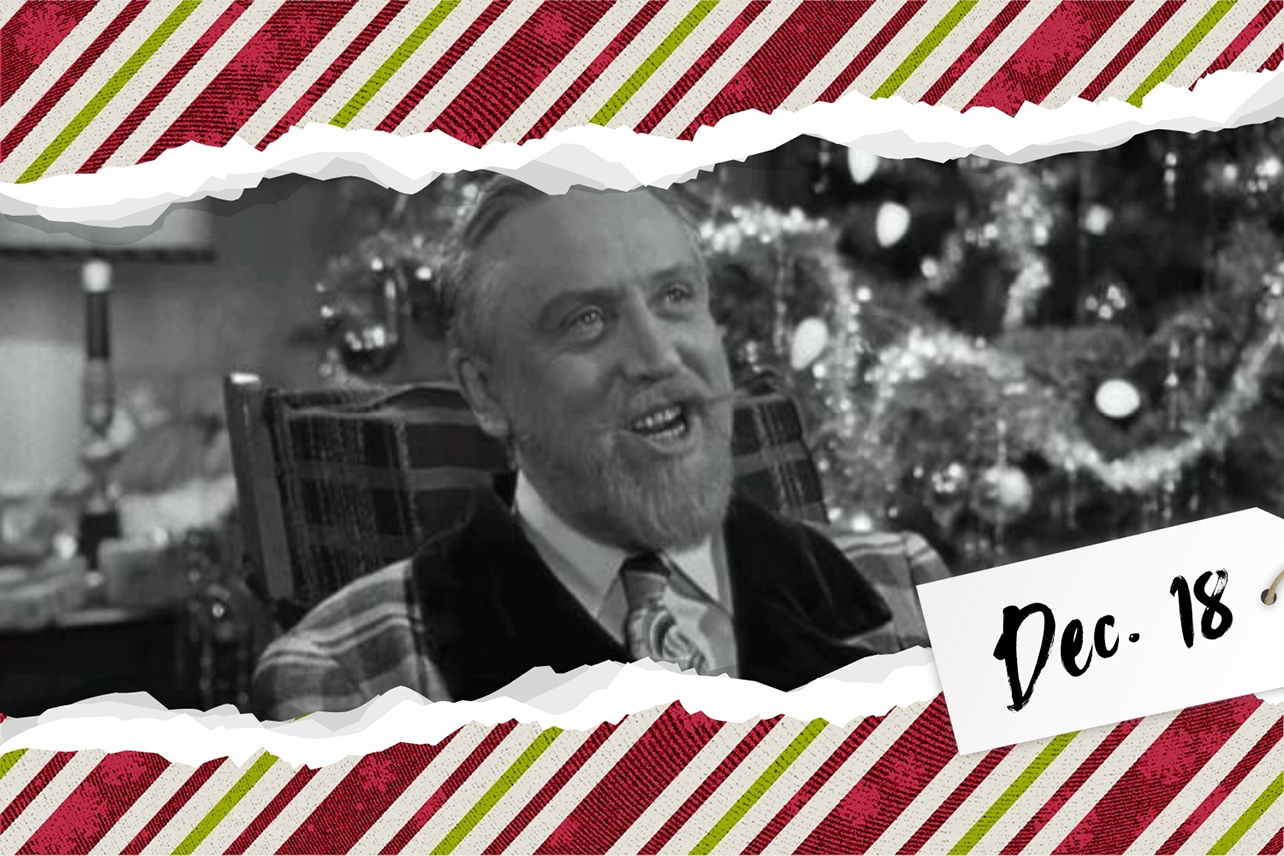It's a quintessential queer story: You were obsessed with a movie as a kid that, in retrospect, should have made it all obvious. For me, it was the 1987 fantasy romcom Mannequin, and the VHS tape I played over and over and have memorized to this day. How my parents didn't figure out I was gay when my first two favorite movies were this and The Little Mermaid, I'll never understand.
If you know the movie, and especially if you're queer, you can probably figure out why a gay kid would gravitate toward it. It's got '80s glam and fashion; it's got campy humor; it's got gay icons like Kim Cattrall and Estelle Getty; it gave us "Nothing's Gonna Stop Us Now"; and most importantly, it has an explicitly gay breakout character in Hollywood Montrose.
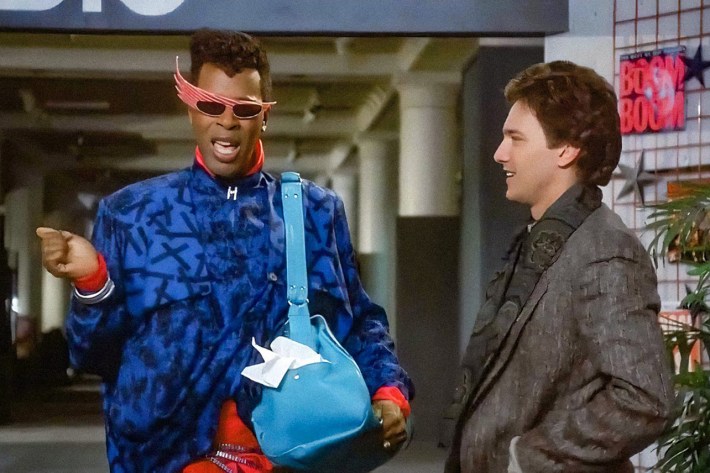
But the queerness of Mannequin goes deeper than those surface details. This movie is — hear me out — about the queer experience at its core.
For the uninitiated, Mannequin centers on an artist named Jonathan Switcher (Andrew McCarthy) who falls in love with the store mannequin he built, which is also the reincarnation of a time-hopping ancient Egyptian woman named Ema "Emmy" Hesire (Kim Cattrall, yes, playing an Egyptian … it was the '80s). Unfortunately, the mannequin can only come to life as Emmy when no one but Jonathan is looking, and she's longing for adventure and excitement. This is also wrapped up in a pro-capitalist feud between an evil corporate mall run by scheming industrialists and a nice family-owned department store filled with weirdos. It's a silly and borderline nonsensical movie that never asks you to take it seriously, but that's a feature, not a bug.
Mannequin isn't unintentionally campy, either. Writer/director Michael Gottlieb deliberately pushed the performances to be as big and bombastic as possible, reveling in the camp from cartoonish reactions and slapstick setpieces. There is literally a three-minute musical dance sequence complete with 14 individual costume changes!
This is a very indulgent movie by design. It's why critics absolutely savaged it at the time, and also why some now call it "so bad it's good" while the intellectuals unironically give it five stars. It's no surprise it has a gay fanbase for those reasons alone.
At the forefront of the queer conversation is Hollywood Montrose (Meshach Taylor). He's without a doubt the most popular character from the movie, so much so that he's the only actor to return for the sequel. Some well-meaning critics at the time accused Hollywood of being a caricature of gay stereotypes, but you'd be hard pressed to find queer people nowadays who agree. He's a gay man of color being as proudly gay as possible — and not just flamboyant and lively, but also someone with an interior life, as we frequently hear about his ups and downs with otherwise unseen boyfriend Albert. It's refreshing to see, especially in 2025.
He's heroic throughout, too — not just supporting Jonathan and Emmy but actively saving them multiple times. If you know anything from this movie, you probably know Hollywood holding a firehose and yelling "Two things I love to do: that's fight and kiss boys" as he rescues Jonathan from security guards. Hollywood rocks.
The movie itself loves him, too. Our main characters not only accept Hollywood's queerness from the get-go, but actively engage with it. In fact, the only time it's negatively commented on is by one of the overt villains — bumbling security guard Felix refers to Hollywood as "Little Mary" and asks Jonathan, with a snide lisp, "Where do you people come from?" Jonathan doesn't rebuff the accusation that he's gay himself, though, and simply defends Hollywood by calling Felix a bigoted jerk. (Said bigoted jerk gets hauled away kicking and screaming by the cops at the end of the movie, by the way.)
That, then, ends up being the key to how deep in this film's bones the queerness truly goes. With Hollywood as a cipher, Mannequin makes it clear that we're supposed to embrace the big, flamboyant weirdos; that queerness should be celebrated and your uniqueness makes you better. And it extends to the entire world of this movie and its ostensibly cishet romance.
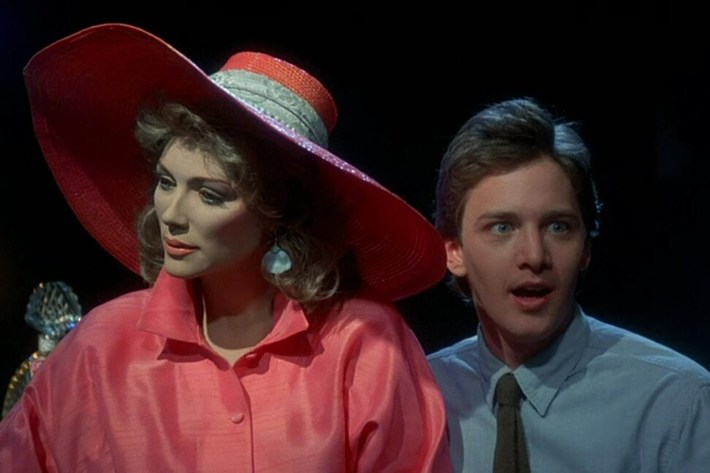
Right from the second we meet our main character Jonathan, we see him as an odd, unmasculine artist, a big dreamer who doesn't fit in and whose mom says "was always different." He's just trying to be himself in a world that doesn't let him thrive, and in an unhappy relationship with an unsatisfied girlfriend he seems to have no sexual chemistry with whatsoever.
And then, of course, he meets a magical time-traveling mannequin lady. Emmy opens up a new world for Jonathan that lets him be with someone he loves in a way he's never loved anyone before, even if he'd be afraid to out himself to his mom and boss about it. On paper, his relationship with Emmy should be a proto-Manic Pixie Dream Girl scenario — a quirky woman who wants to have adventures makes his boring life exciting. But the movie smartly ties their relationship into his new job at Prince & Company, a place where, for the first time, he's allowed to let loose without judgement and be loved for and comfortable with who he is.
None of this is subtext, either! Jonathan says as much to his ex-girlfriend, who struggles to understand what could possibly be so special about finding his people. And with Emmy bringing out his best self, he suddenly becomes a star with their creative window displays, moving up the ranks of Prince & Company and saving the store from bankruptcy.
At the same time, Jonathan and Emmy's romance is presented as a secret relationship that they assume no one would understand or approve of, and it's a big step when they go out in public together for the first time. For them, it's because Emmy presents as a mannequin to the world. From the perspective of a queer person, well…I'm sure you're catching on.
Once the relationship becomes an open secret at Prince & Company, we see the whole spectrum of tolerance and allyship on display. There's the "only tolerant to your face" brand (ex. coworkers who are perfectly nice to Jonathan as he carries a mannequin into the women's restroom, but still eavesdrop and gossip about his eccentricities). We also also get the more benign "I don't care what you do because I see your value as a human being" form of acceptance from Mrs. Timkin (Estelle Getty). As Jonathan's boss, she ignores complaints from bigoted coworkers, protecting his job and reputation while she pretends to not know about his relationship.
And then we circle back to Hollywood, who both embraces and actively encourages Jonathan's weirdness. When they first meet, Jonathan tries to claim "I'm just a regular guy," but Hollywood responds, "Don't disappoint me." It's the first of many times Hollywood, queer mentor that he is, tries to get Jonathan to come out and be even weirder. He's there to make it clear that being a freak is the goal, and being proud is the entire point.
On the flipside, the villainous employees of Illustra are disgusted by Jonathan; Felix's reaction to seeing him with Emmy is to call him "sick" and a "pervert" and then beat him up. And when the villains take photos of Jonathan and Emmy, the threat is all about exposing a relationship that the outside world doesn't approve of, and it's explicitly said that it would cost him his career and destroy his reputation. Sound familiar?
The last piece is James Spader's character, Mr. Richards, a collection of foppish, vain, and subservient traits that feel like the queer coding of a Disney villain. If there was no other queer character in the movie, it would be a problem (Spader is definitely playing this guy as a weasley little gay freak). But with Hollywood as a foil, Richards makes a lot more sense. If he's queer, he's never out about it, so it's a stark depiction of how denial and self-loathing can turn you into a monster while our "out" characters are being their best selves.
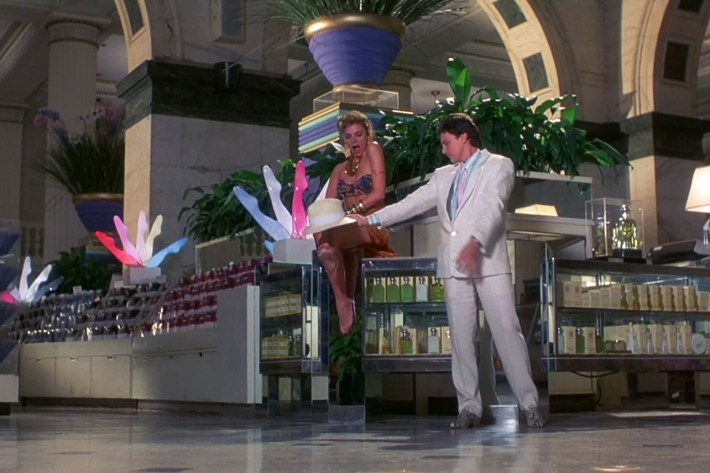
Once you open that can of rainbow worms, you realize that this movie is filled with gender-bending, queer-saturated jokes. Jonathan's name is literally Jonathan Switcher (and at one point Hollywood stands next to a lady mannequin and jokes "Mom will think I switched!"). Jonathan, when building Emmy, briefly puts her torso on "the wrong sex." Emmy cheekily jokes that Michealangelo "was involved with some guy named David." Mrs. Timkin says her husband "died the way he wanted…in women's lingerie." The head of Illustra claims "half the guys in this store probably wear lace underwear." In fact, it's an entire running joke that men are super fascinated by or implied to be wearing women's panties.
In a vacuum, individual jokes might read as homophobic or transphobic in a "boy, 80s comedies were problematic" kind of way. But packed together with all the queer and queer-coded characters, it feels like a thriving ecosystem of queerness. No character gets out of this movie without being related to something kind of gay!
At the climax, the magic spell is overcome by the power of love or Egyptian Gods (or whatever). Emmy is no longer a mannequin, and she and Jonathan can finally be together in public, everyone now seeing their relationship for what it always was. The movie ends with their wedding in the window display of Prince & Company, where Hollywood and Mrs. Timkin — the family who accepted them without hesitation or judgement — are at the forefront.
The core idea of this fun, silly movie — one full of queer characters, references, coding, and allegory — is that you should be out and proud. Maybe that means being gay or queer, or maybe it means being an artist or just any category of weirdo. What matters is finding the community where you'll be appreciated and loved as your freakiest self, filled with the people who don't just accept you, but encourage you to be who you are.
That's a message I'm so thankful I heard as a closeted gay kid every time I'd rewind that Mannequin tape. And I'm happy to be reminded of it now.
If you haven't already, consider supporting worker-owned media by subscribing to Pop Heist. We are ad-free and operating outside the algorithm, so all dollars go directly to paying the staff members and writers who make articles like this one possible.
